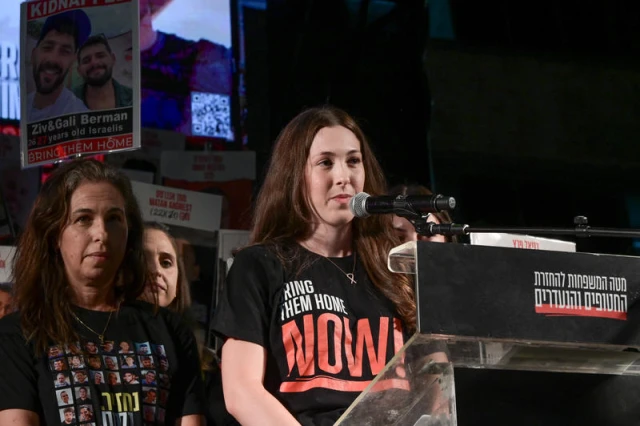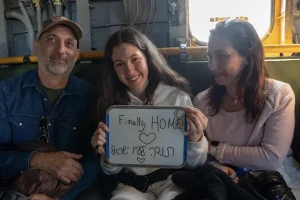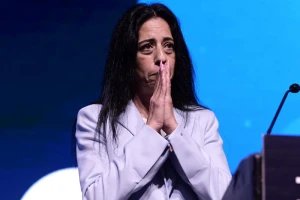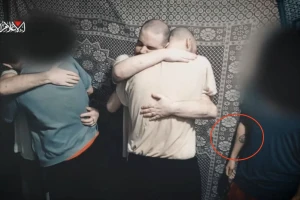Freed Israeli hostage Naama Levy: Israeli airstrikes ‘put me in the greatest danger’ during captivity in Gaza

While protests against the Israeli government continued on Saturday night in Tel Aviv’s Hostages Square, one notable speaker addressed the crowd - Naama Levy.
The world watched in horror on Oct. 7, 2023, as Levy was dragged by her handcuffed arm by her captor, limping with bleeding ankles and bloodied pants – images that sparked global outrage and calls for women’s rights, as well as urgent demands to bring the hostages home from Gaza. The Hamas-led attack on communities in southern Israel resulted in the massacre of 1,200 people and the abduction of 251 into Gaza.
Levy drew significant attention as she addressed the crowd of thousands, speaking openly about her worst fear during captivity: the IDF airstrikes. “I was convinced every single time that I was finished,” she said, describing the terror she felt during the bombings.
Noting that the strikes would “come by surprise,” Levy described what it was like. “First, you hear a whistle, pray it doesn’t fall on you, and then – the booms, a noise loud enough to paralyze you. The earth shakes.”
“I was convinced every single time that I was finished, and it’s also what put me in the greatest danger: one of the bombardments collapsed part of the house I was in,” she explained. “The wall I was leaning on didn’t collapse, and that’s what saved me.”
“That was my reality, and now it’s their reality. At this very moment, there are hostages who hear those same whistles and booms, shaking with fear. They have nowhere to run, they can only pray and cling to the wall while feeling a horrible powerlessness,” she added.
In the first days following the Oct. 7 attack, Levy said she was initially held alone with only her captors, and “We were constantly on the run.”
“There were entire days without food and little water. One day, I had nothing left, not even water. Fortunately, it started raining. My captors put a pot outside the house where I was held, and the rain filled it,” she recalled. “I drank that rain water, which was enough for a pot of rice. That’s what kept me going.”
Levy reflected on her time in captivity, expressing disbelief that anyone in Israel could truly understand the hostages' suffering and still allow them to remain in Gaza. “But then the first hostages came back [to Israel], and they said what was happening there [in Gaza],” she said. “They told the truth. That truth wasn’t enough.”
She said the protests demanding the hostages' release brought her a deep sense of comfort while she was held captive.
“During that terrible and unimaginable time, they told us that we had been forgotten – but I didn’t believe it. I knew people were fighting for me, because on Saturday nights, when I was allowed to watch television – I saw you, in this square. There, in captivity, I saw thousands standing here wrapped in flags, shouting, singing, holding pictures of the hostages, including mine. You made me feel that I was not forgotten.”
The primary anti-government rally was held at Tel Aviv’s Habima Square, where protesters called for an end to the war and the holding of new elections in Israel. Demonstrators also voiced frustration over the unequal burden placed on reservists, highlighting the continued exemption of most ultra-Orthodox yeshiva students from military service.
Ahead of the rallies, a group of hostage families – vocal critics of the government – held their weekly press conference in Tel Aviv. They condemned Israeli Prime Minister Benjamin Netanyahu for prolonging the war and raised alarm over his reported plan to appoint a new Shin Bet chief who is said to oppose a potential hostage deal.
Another well-known spokesperson for the hostages, Einav Zangauker – whose son Matan is being held in Gaza – sharply criticized Netanyahu, saying, “An eternal, politically motivated war is preferable [to him] over the return of civilians kidnapped on his watch."
“He prefers to flatten Gaza indefinitely, even at the price of 58 Ron Arads,” she added, referring to the Israeli pilot who disappeared during a mission in 1986 and has been missing ever since.
Yehuda Cohen, the father of hostage Nimrod Cohen, denounced Netanyahu for avoiding accountability.
“How is it that after 600 days, he proposes a selective deal?” he said, referring to a possible agreement that would free only part of the hostages. “This is a death sentence for whoever is left behind. I call upon President Trump – only you can stop this disaster and return everyone home.”
The crowd, known for its weekly use of drums and other noisemakers, lit fires and chanted, “Why are they still in Gaza?”
Zangauker criticized the government for prioritizing its own agenda over securing a deal to free the hostages.
“They will continue sending our troops to the front, to create settlements on the backs of our hostages. They’ll continue sabotaging the country and shirking responsibility.”
She argued that meaningful progress would only come with a change in leadership, saying, “In order to reach a deal that will release all the hostages, we have to kick out this government.”

The All Israel News Staff is a team of journalists in Israel.
You might also like to read this:










